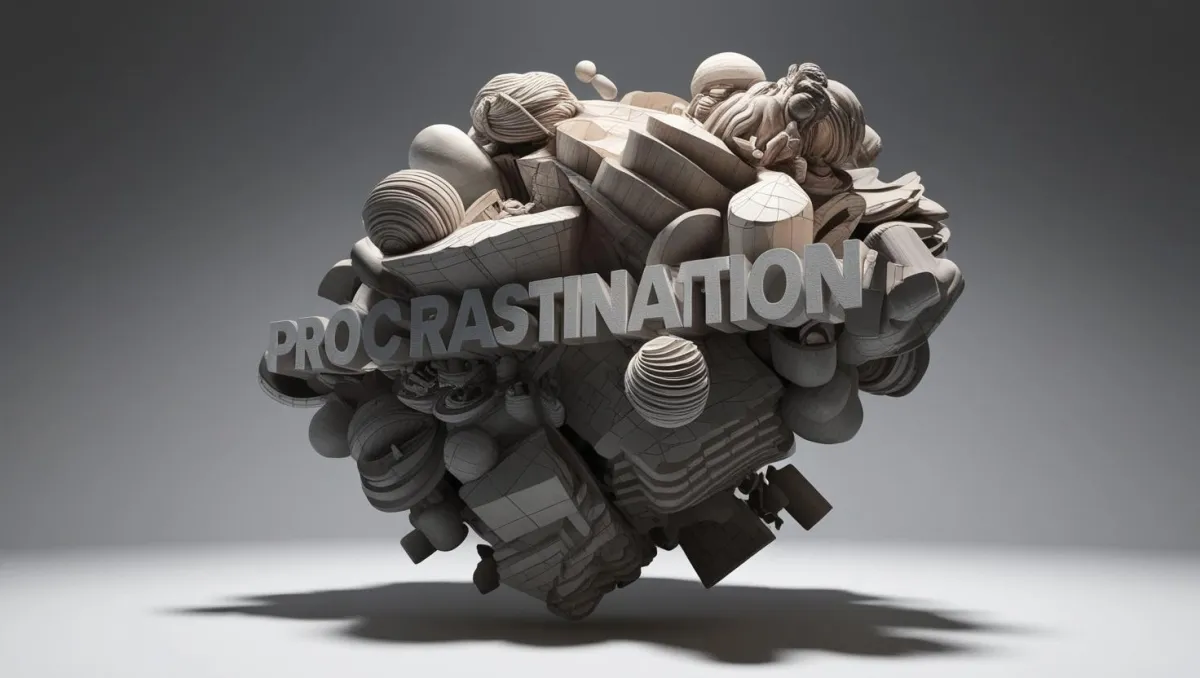Blog

Why We Procrastinate: The Real Reason You Can’t Get Things Done
You know that feeling, right? You’ve got a mountain of work staring you down. That important project, that looming deadline, the task you’ve been putting off for weeks. You tell yourself, “Okay, just five more minutes of scrolling,” or, “I’ll start right after this video.” But those five minutes turn into an hour, then a day, and suddenly, you’re knee-deep in regret, stress, and frustration. Sound familiar?
We’ve all been there. We know procrastination is bad for us. We know it leads to missed opportunities, lower quality work, and a whole lot of unnecessary anxiety. So, why do we keep doing it? Why can’t we just… get things done? If procrastination were an Olympic sport, most of us would be gold medalists except we’d probably put off showing up for the ceremony. Which, let’s be honest, is kind of hilarious, until it’s not. But seriously, what’s going on in our brains that makes us so good at putting things off? Today, we’re diving deep into the science and psychology behind procrastination to uncover the real reasons you can’t seem to break this frustrating cycle. We’re going to explore your brain’s desire for immediate pleasure and your conscious awareness of long-term goals.
Let’s get one thing straight: Procrastination isn’t laziness. It’s a complex battle happening inside your brain. Think of it as a tug-of-war between two systems. On one side, you have your limbic system. This is the ancient part of your brain that craves instant gratification. It’s wired for survival, seeking immediate rewards and avoiding immediate threats. It wants the dopamine hit from scrolling, watching videos, or anything that feels good right now. On the other side, you have your prefrontal cortex. That’s the rational, planning part of your brain that knows you should be working on that important task. It’s the seat of executive function, responsible for decision-making, planning, and self-control.
The limbic system is a master of what’s called “temporal discounting.” It prioritizes short-term comfort over long-term benefits. “Why suffer now,” it says, “when you can feel good instantly?” The future, even a future just a few hours away, feels distant and less real compared to the immediate moment. And our brains are wired for dopamine. Social media, entertainment, those notifications they’re all designed to hijack our brains with quick hits of pleasure. These platforms are engineered to keep us engaged, providing a constant stream of novel stimuli that trigger dopamine release.
Studies have shown that chronic procrastinators experience higher levels of stress and anxiety. They’re constantly battling the internal conflict between what they should be doing and what they’re actually doing. This internal conflict creates a sense of unease and guilt, which can further fuel the cycle of procrastination. Research into the neuroscience of procrastination reveals that individuals prone to delaying tasks often have a weaker connection between the prefrontal cortex and the limbic system. In fact, research by psychologist Piers Steel suggests that procrastination is closely linked to impulsivity — the tendency to prioritize short-term rewards over long-term benefits. Similarly, studies by Timothy Pychyl highlight that procrastination isn’t just about poor time management; it’s an emotional regulation issue. This means the impulsive, pleasure-seeking part of the brain has a stronger influence over behavior, making it harder to resist distractions and focus on long-term goals.
But here’s the thing: Procrastination often feels out of our control. It’s not just about time management; it’s about emotional regulation. We procrastinate because we’re avoiding discomfort. That discomfort could be the fear of failure, the pressure of perfectionism, or simply a lack of motivation. When faced with a challenging task, our brains perceive it as a threat, triggering the fight-or-flight response. In this case, “flight” manifests as avoidance procrastination. Perfectionism plays a significant role, as the fear of not meeting impossibly high standards can lead to paralysis.
Then there’s the “present bias.” We underestimate how much effort a task will require later and overestimate our future motivation. “I’ll feel like doing it tomorrow,” we tell ourselves. But tomorrow comes, and the cycle continues. We tend to believe that our future selves will be more capable, more motivated, and more efficient than we are in the present. This illusion of future productivity allows us to justify putting things off.
And let’s not forget shame. When we procrastinate, we often beat ourselves up. This self-criticism only makes things worse, creating a negative feedback loop that reinforces procrastination. Shame and guilt create a sense of emotional burden, which can further diminish our motivation and ability to focus. The more we criticize ourselves, the more we reinforce the belief that we are incapable of completing the task, leading to further avoidance.
So, what are the real consequences of procrastination? In the short term, you’re looking at missed deadlines, last-minute stress, and lower-quality work. Imagine a student cramming for an exam or a professional rushing to finish a major project. The results are rarely their best. The stress of last-minute work can also lead to burnout and decreased overall performance.
But the long-term effects are even more damaging. Lower self-confidence, decreased career success, and even mental health struggles. Procrastination becomes a habit, a pattern that erodes your potential and well-being. Over time, chronic procrastination can lead to feelings of inadequacy, diminished self-worth, and a sense of being trapped in a cycle of failure. It can also strain relationships, as others may perceive procrastinators as unreliable or irresponsible.
The good news? Procrastination isn’t a life sentence. It’s a habit that can be broken with the right strategies. By understanding how your brain works, you can start rewiring it for productivity instead of avoidance. So, how do you break free from the procrastination cycle? Here are some science-backed strategies to help you get things done.
First, the “Two-Minute Rule.” Break down big tasks into super small steps that take only two minutes to complete. Start with something easy, and build momentum. This approach reduces the initial resistance to starting a task, making it feel less daunting.
Next, try the Pomodoro Technique. Instead of relying on sheer willpower, work in focused sprints 25 minutes of deep concentration, followed by short breaks. This structured approach prevents burnout, keeps you engaged, and makes big projects feel more manageable. By working with your brain’s natural attention span, you stay productive without exhausting yourself.
Then, there’s temptation bundling, another powerful tool in which you pair an unpleasant task with something you enjoy. For example, listen to your favorite podcast, like Zest 2 Live, while doing chores. This strategy leverages the brain’s reward system, making it more appealing to engage in less desirable activities.
And finally, Cognitive Reframing. The way you think about a task influences your motivation. Instead of seeing them as a burden, view them as opportunities for growth. Reframe it as something that challenges you, teaches you, or benefits your future self. Shifting your mindset can make even the most daunting tasks feel less overwhelming.
Most importantly, practice self-compassion. Shaming yourself for procrastinating only makes it worse. Treat yourself with kindness and understanding. Recognize that everyone struggles with procrastination at times, and that it’s a normal human experience.
Remember, progress, not perfection, is the key. Small, consistent actions beat occasional bursts of motivation every time. You don’t have to feel ready to start. Just take the first step, and the motivation will follow. Taking action, even small action, can create a sense of momentum and build confidence.
You have the power to break free from procrastination and achieve your goals. Start today, and watch your life change. Download the Luvo app for free helpful tips.
Categories

© Copyright Luvo 2022
